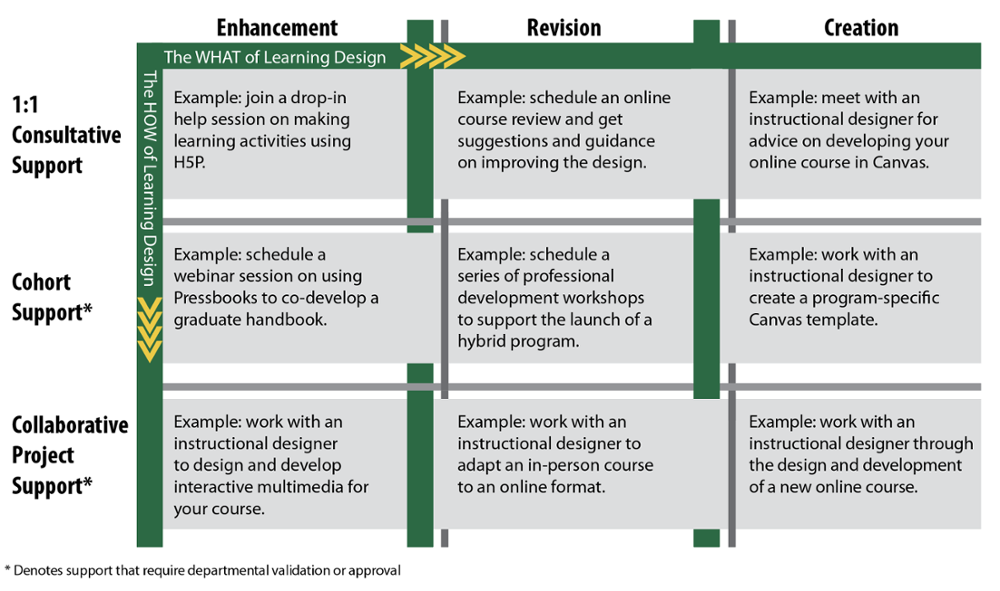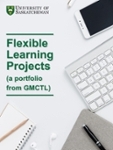The GMCTL collaboratively supports intentional design for learning and advancing flexible and equitable learning opportunities at USask. Our goal is to help create learning experiences that lead to students achieving course outcomes and developing core competencies, while advancing institutional strategies and meeting engagement and retention goals.
Our team includes instructional designers, learning technology specialists, and administrators with expertise and experience in:
- Designing courses for flexible (online, blended, and hybrid) modalities.
- Developing full course environments and digital media for online, blended, and hybrid learning.
- Using the learning technology tools of USask's Learning Technology Ecosystem (LTE) in learner-centered and intuitive ways.
- Working alongside faculty and instructors as they expand their teaching skills into virtual spaces.
- Helping departments and colleges define and execute flexible learning plans for their programs.
On this page, you will find resources from the GMCTL to support your work in course design, course development, and teaching in flexible formats. You can also learn more about connecting with our team to get more customized supports for your online, blended, and hybrid learning projects.
Intentional design matters in all types of learning, but it is particularly important to online, blended, and hybrid learning environments because of how critically the design influences several elements, including:
- Alignment of objectives, assessments, and activities.
- Engagement of the learner with the content, the instructor, and their fellow learners.
- Providing a valuable learning experience (or "look and feel") in virtual contexts.
- Accessibility in digital environments.
All these elements are essential for effective and successful learning experiences, and particularly so with an online, blended, and hybrid approach, where the learner may have fewer immediate supports and instead must rely on the previously designed structure and resources to navigate and succeed in their learning journey.
Supported Course Design & Development
The GMCTL can work alongside USask faculty and educators by customizing the WHAT of Learning Design (what will you be producing?), as well as the HOW of Learning Design (how can we best support you?). Understanding your design problem and your support needs will help us customize an approach that works for your course, your program, and your learners. See the following table for some examples.

Deciding on the WHAT of Learning Design is driven by analysis of the learners and their needs, and defining the learning goals at hand. It also depends on your starting point. The approach to take might be:
- Enhancement: add or change a specific element to improve an existing course or learning resource.
- Revision: make updates or overhauls to a course, transfer a course from one delivery format to another (for example from in-person to online), or adapt/remix an open resource to better fit your needs.
- Creation: make a new course or other learning resource, from the ground up.
Deciding on the HOW of Learning Design is driven by conversation with the educator to understand their needs, and the broader context in which they are working to facilitate learning. The approach to take might be:
- 1:1 Consultative Support: as-needed advice and coaching to help an individual meet their own teaching goals.
- Cohort Support: group-based advice and coaching to help several educators, working together in a cohort, meet the teaching goals of their department or program.
- Collaborative Project Support: hands-on design and/or development support tied to a particular project.

See What We've Done!
To see examples of digital learning materials and flexible courses that the GMCTL has helped to create, explore the samples in our Flexible Learning Projects portfolio.
1:1 Consultative Support

The GMCTL is always happy to share our experiences designing online learning activities and using learning technologies effectively in online, blended, or hybrid classrooms, and even across an entire program. Our staff has expertise to answer your questions, and give you advice and guidance about:
- Instructional strategies in online, blended, and hybrid courses
- Selecting and using the right learning technology tools
- Using the LMS (Canvas) to structure learning experiences
- Open textbook and OER developments
- Fostering interactive and social learning at a distance
- Assessments for online learning, from exam strategies to ePortfolios and beyond
- Academic integrity in online contexts
- Copyright clearances, acquisitions, and OER licensing
- Digital accessibility standards (i.e., WCAG)
Online Course Reviews *New Service
This collaborative process begins with a brief review of your course by one of our Instructional Designers. Using a rubric, we then provide questions, comments, and feedback on your approaches to:
|
|
The feedback provided will help you define some goals for improving your teaching practice, and from there we can direct you to resources to help you achieve those goals.
Cohort Support

This team-based approach to online, blended, or hybrid course development involves scheduling a defined period for recurrent group PD sessions that connect several instructors directly to an Instructional Designer. The ID can answer technical and pedagogical questions, provide resources, links, how-to's and samples, discuss online teaching strategies, and provide feedback and recommendations as your team prepares their courses. With a cohort-based approach, you can access advice and coaching support from an Instructional Designer who will:
- Scope out your team's needs and identify any customized resources you might require.
- Customize the selection of learning strategies and the development of resources and tools (e.g., program-specific development templates) that will fit with the needs of your students and your program.
- Coach your team members in how to apply those strategies and tools as they develop and teach their courses.
- Debrief with your team at the end of the cohort period, gather feedback on your team's progress, and connect you with further supports as needed.
If you are interested in arranging cohort support for your team, email flt@usask.ca.
*Please note that accessing this support approach requires departmental validation or approval.
Collaborative Project Support

The GMCTL uses a well-established process to creating effective and engaging learning experiences for online, blended, and hybrid formats. With a project-based collaboration, an Instructional Designer and the educator works together to create a full design plan and then develop a new course (or another resource, like an open textbook), from start to finish. With a project-based collaboration, you can access support from the GMCTL who will work alongside you to:
- Scope out your project by analyzing your support needs and the needs of your learners and your program.
- Design your course fully by defining objectives and assessments, and selecting strategies, materials, and tools for learning.
- Develop (or co-develop) learning materials, with possible supports including media creation, completing the Canvas build, ensuring copyright compliance, and quality assurance review.
- Support the instructor during the pilot offering of the course with as-needed teaching and technical help.
- Evaluate the completed learning experience by gathering student and instructor feedback, identifying areas of potential improvement, and assisting with necessary post-pilot revisions.
This customizable development model ensures supports from our teaching and learning professionals are applied where you need them most, including (according to department needs) delivery support arrangements while the course is actually offered.
If you are interested in arranging a new development project, email flt@usask.ca.
*Please note that accessing this support approach requires departmental validation or approval.
Learning Technology Support
- Consultations,
- Workshops,
- Support with requesting new learning technologies,
- Creation of web resources and teaching guides for learning technologies, and more.
Get Help
Still have a question about online, blended, or hybrid learning? Not sure where to begin? Have a project in mind, but not sure where it fits in?
If you are interested in discussing learning technology support email GMCTL's Flexible Learning Technology team.

